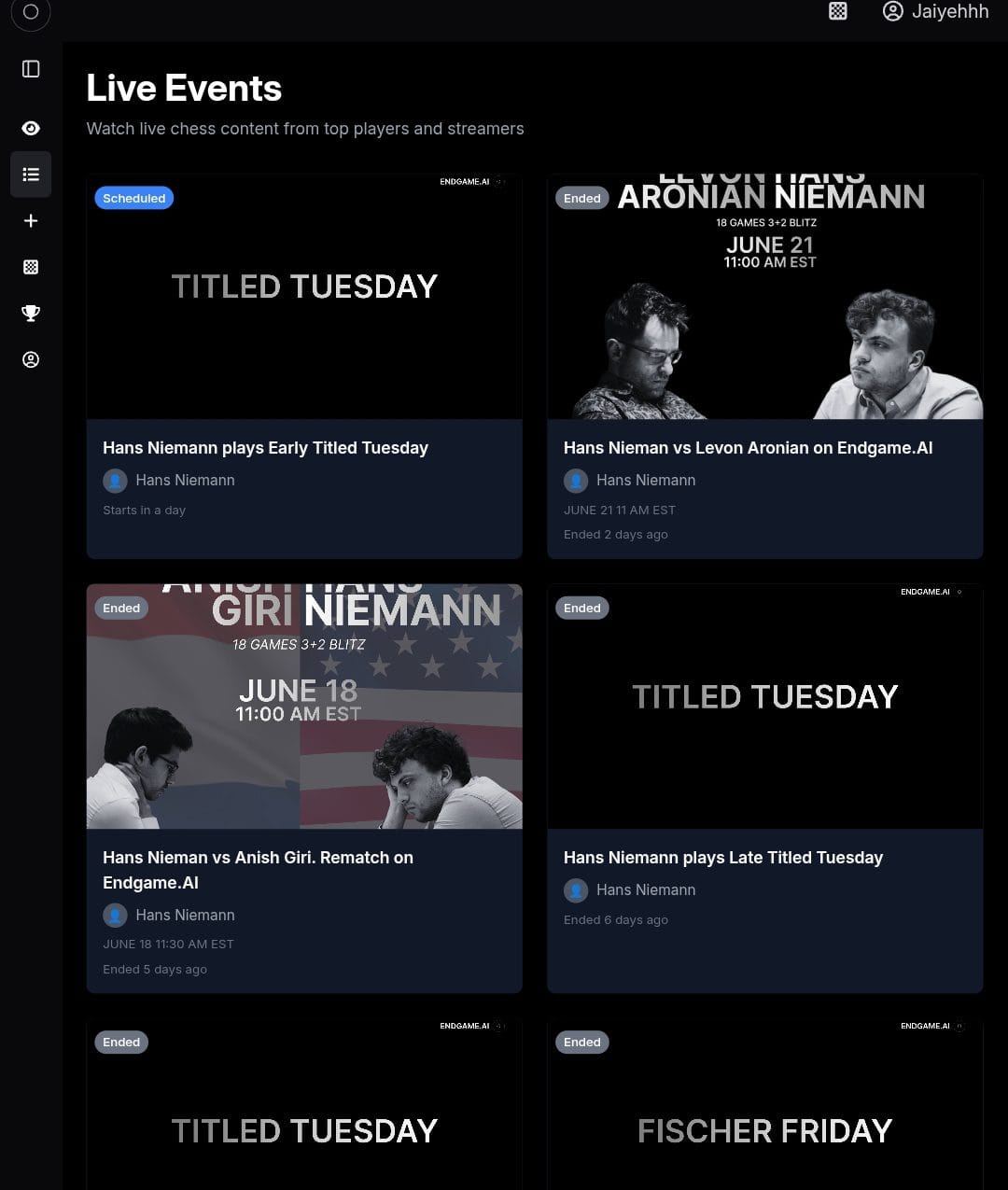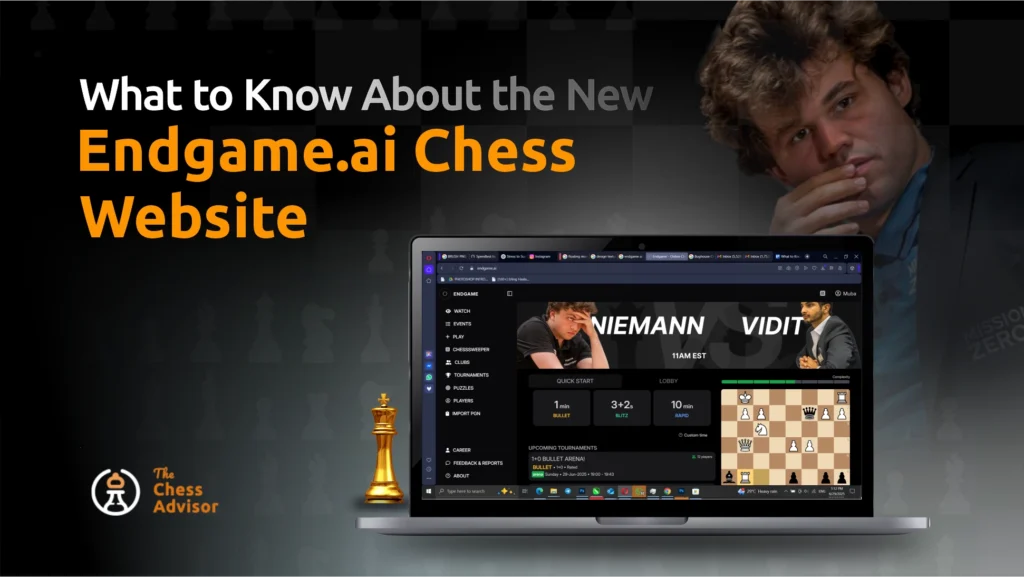The world of online chess is a sprawling, digital kingdom. It is occupied by two major chess websites with thriving communities and fierce loyalties.
And into this competitive space enters a bold new chess website called Endgame.ai.
Endgame.ai is a new chess platform that promises to revolutionize online chess. The platform is currently majorly fronted by the controversial grandmaster Hans Niemann.
This has generated significant online buzz for the platform.
But beyond the marketing hype, what exactly is Endgame.ai?
Let’s examine everything we know so far about this platform.
What is Endgame.ai?

Endgame.ai is a new and developing online chess platform. It is heavily promoted by the controversial American Grandmaster Hans Niemann.
It presents itself as a direct competitor to the established chess websites.
Endgame.ai markets itself as both a playing platform and an AI-driven chess enhancement tool. It aims to provide a comprehensive ecosystem for playing, learning, and competing.
The platform is currently in the beta testing phase, with users able to sign up for early access.
The platform has demonstrated core functionality through high-profile matches streamed by Hans Niemann.
These demonstrations have showcased live gameplay capabilities and the user interface. But the full suite of promised AI features remains largely under development.
The Vision Behind Endgame.ai
To understand Endgame.ai, one must first read its mission statement. According to its official messaging, the platform aims to be “Your ultimate online chess platform”.
Endgame.ai presents itself as a movement against what it terms the chess establishment. It positions itself as a global, accessible platform for all, designed to break down barriers and end the era of “gatekeepers” and “hidden deals“.
This “us versus them” anti-establishment narrative is the philosophical bedrock of the platform. By invoking a shadowy “Chess Mafia,” Endgame.ai is trying to tap into the notoriety of its backer, Hans Niemann.
Endgame.ai deliberately cultivates an image as the champion of ordinary chess players against an unnamed but implied chess establishment.
It speaks to players who may feel overlooked by the major platforms by promising “fair prizes, open tournaments, free tools, and real chances”.
However, this raises important questions about the platform’s true intentions. Is this anti-establishment stance a genuine mission to democratize chess, or a sophisticated marketing ploy?
The Hans Niemann Factor

Hans Niemann serves as the primary face and spokesperson for Endgame.ai.
Niemann is one of the most polarizing figures in modern chess history. His explosive rise and the cheating scandal have made him a household name.
He has actively promoted the platform through his social media channels, particularly his Twitch and YouTube streams.
Niemann’s history makes him the perfect, if problematic, frontman for a platform built on a narrative of rebellion.
The relationship is symbiotic. Niemann, who claims he is consistently denied opportunities, needs a platform to build an independent power base.
Endgame.ai, in turn, needs Niemann’s immense notoriety to slice through the market’s noise and capture immediate, global attention.
This association is, however, a double-edged sword. While Niemann brings a dedicated and fiercely loyal fan base, he also carries significant baggage.
This association also means that Endgame.ai’s reputation is inextricably linked to Niemann’s. Any future controversies involving the grandmaster could reflect poorly on the platform.
What Will Endgame.ai Actually Do?
Based on current observations and promotional materials, Endgame.ai appears to offer standard online chess functionality.
This includes features like live game hosting, tournament capabilities, and streaming integration.
Recent matches have demonstrated the platform’s ability to host competitive games between grandmasters, though not without technical challenges.
The platform promises to introduce features “the chess world has never seen,”.
The “AI” in Endgame.ai suggests that artificial intelligence will be central to the platform’s value proposition.
Recent high-profile matches hosted on the site have served as a public beta test.
In early June 2025, Niemann played a series of blitz and Chess960 (Fischer-random) matches against top Grandmasters Anish Giri and Nihal Sarin on the platform.
How Endgame.ai Plans to Compete with Established Platforms
The online chess market is dominated by Chess.com and Lichess. Both platforms have cultivated loyal user bases, making market entry challenging for newcomers.
Chess.com’s strength lies in its comprehensive ecosystem of educational content, professional tournaments, and celebrity partnerships.
Endgame.ai’s challenge is convincing users to switch from a familiar, feature-rich platform to an unproven alternative.
Endgame.ai cannot simply offer “Chess.com but free” and expect to succeed. It needs genuine differentiation.
Lichess presents a different competitive challenge. It’s a completely free model, supported by donations.
Lichess already occupies the “free chess platform” niche that Endgame.ai claims to target.
This creates a fundamental question: How can Endgame.ai differentiate itself from a platform that already offers free, high-quality chess tools?
What This Means for the Future of Online Chess
Regardless of its ultimate success, Endgame.ai’s arrival could benefit the entire online chess ecosystem.
Competition typically drives innovation, and established platforms may improve their offerings in response to new challengers.
The platform’s emphasis on AI-powered personalization might accelerate the development of more sophisticated AI training tools.
Also, if Endgame.ai successfully offers premium features for free, other platforms may be forced to reconsider their subscription models.
The anti-establishment messaging addresses real concerns within the chess community about transparency, fairness, and access to opportunities.
If Endgame.ai successfully addresses these issues, it could pressure established platforms to become more responsive.
Its innovations and messaging might influence how established platforms develop features and engage with their communities.
Conclusion
Endgame.ai has made a dramatic entrance onto the board. It has a bold vision, a charismatic and controversial champion, and the attention of the entire chess world.
But its greatest challenges lie ahead. It must live up to its monumental hype and build a stable and feature-rich platform. It must prove it can offer tangible value in a market with deeply entrenched leaders.
The success of Endgame.ai will not be determined by its manifesto, but by its execution.
The vision is ambitious, but the code must be clean, the servers stable, and the “never-before-seen” features genuinely game-changing.
Is this the beginning of a new chapter in online chess, a platform that will finally put the old guard in check? We are all waiting.
The true test will come when the platform moves beyond beta testing.
